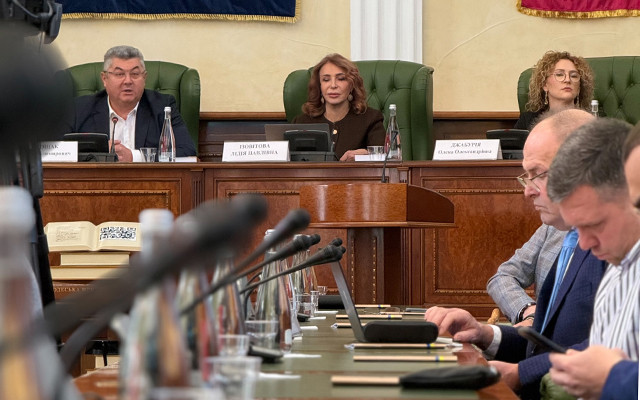
L. Izovitova: today advocacy maintains its independence and fights for guarantees for the profession

The Ukrainian advocacy remains an independent, constitutionally recognized institution of justice, which, in the conditions of war, has not only retained its subjectivity, but also consistently fights for guarantees to protect the profession.
This was noted by Lidiya Izovitova, the President of the Ukrainian National Bar Association and the Bar Council of Ukraine, in her welcoming address to participants at the ХV International scientific and practical conference «Advocacy: past, present and future».
She emphasized that the adoption by the Council of Europe of the Convention for the Protection of the Profession of Lawyer was an event of historic significance for the entire legal community. Ukraine was directly involved in its development and Valentin Gvozdiy, a representative of the UNBA, was elected vice-president of the Committee of experts that directly prepared the text of the document. However, the ratification process in Ukraine is currently complicated by the lack of an agreed official translation and the need to define the list of professions that fall under the concept of «lawyer».
The President of the UNBA, BCU named the adoption of Law No. 4547-IX, which establishes legal liability for publicly identifying an advocate with their client, as the second important step.
She emphasized that the norm does not restrict freedom of speech, as is sometimes presented in public debate, but is aimed at ensuring the independence of advocates and protecting the right of every person to a fair trial. And the prohibition of identification directly corresponds to international standards enshrined in the documents of the Council of Europe, which guarantee the exercise of protection without external pressure or interference.
L. Izovitova cited the decision of the Constitutional Court of Ukraine of September 10, No. 4-r(II)/2025, on the publication of acts of bar self-government bodies as a third example of strengthening institutional guarantees. The court recognized that the decisions of the BCU take effect from the moment of adoption and are internal in nature, not equivalent to normative legal acts of general application. This, emphasized the president of the UNBA, BCU, is official confirmation of the constitutional status of advocacy as an independent self-governing institution and recognition of the profession's right to independently regulate its internal affairs without external control by the state.
At the same time, the advocacy in Ukraine is forced to operate under the strict restrictions of martial law, which, according to L. Izovitova, objectively complicate the holding of congresses and conferences. Therefore, any claims made against the UNBA today should be assessed taking into account these realities and within the framework of responsible professional dialogue, rather than political or media manipulation.
She recalled that the sixth congress was officially convened by the Bar Council of Ukraine back in September 2022, but it became impossible to hold it due to the ban on mass gatherings and the requirement of military administrations to ensure the safety of citizens in regions classified as areas of active or possible hostilities.
According to her, as of the end of October this year, in accordance with the order of the Ministry of community and territorial development, at least 15 regions are in categories where restrictions on movement or a ban on mass events are in force. This makes it impossible to elect delegates, form a quorum, and ensure the physical participation of regional representatives in the congress, as the minimum 14 regions required by law cannot ensure the presence of their delegates.
Separately, the President of the UNBA, BCU focused on proposals to introduce electronic voting. She reminded that in wartime, the stability of electronic systems, the availability of communications, and protection from cyber interference cannot be guaranteed. To confirm this, she cited the position of the chairman of the Verkhovna Rada Ruslan Stefanchuk on the impossibility of holding even national elections using electronic technologies in wartime. At the same time, international standards, in particular the conclusions of the Venice Commission, explicitly require that such systems be completely reliable and transparent — requirements that currently cannot be met.
© 2026 Unba.org.ua Всі права захищені
"Національна Асоціація Адвокатів України". Передрук та інше використання матеріалів, що розміщені на даному веб-сайті дозволяється за умови посилання на джерело. Інтернет-видання та засоби масової інформації можуть використовувати матеріали сайту, розміщувати відео з офіційного веб-сайту Національної Асоціації Адвокатів України на власних веб-сторінках, за умови гіперпосилання на офіційний веб-сайт Національної Асоціації Адвокатів України. Заборонено передрук та використання матеріалів, у яких міститься посилання на інші інтернет-видання та засоби масової інформації. Матеріали позначені міткою "Реклама", публікуються на правах реклами.